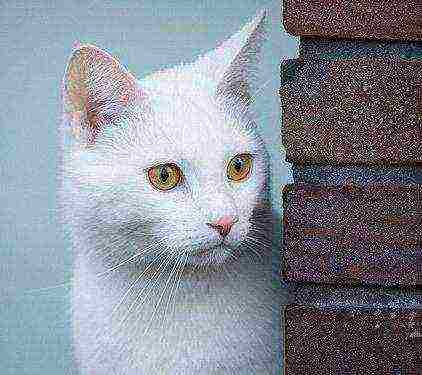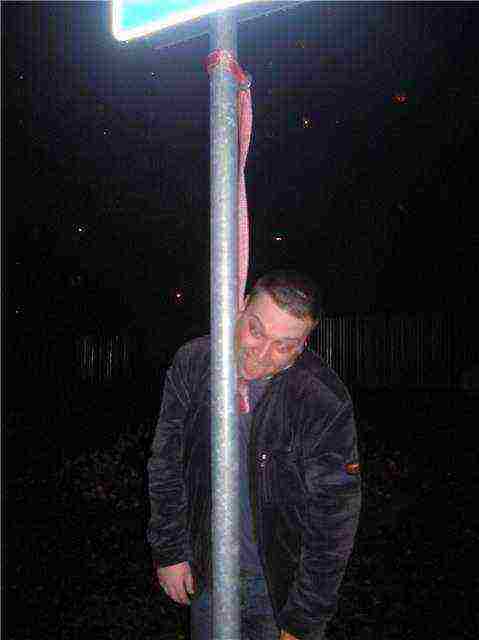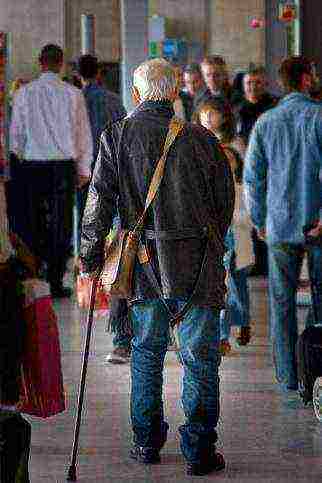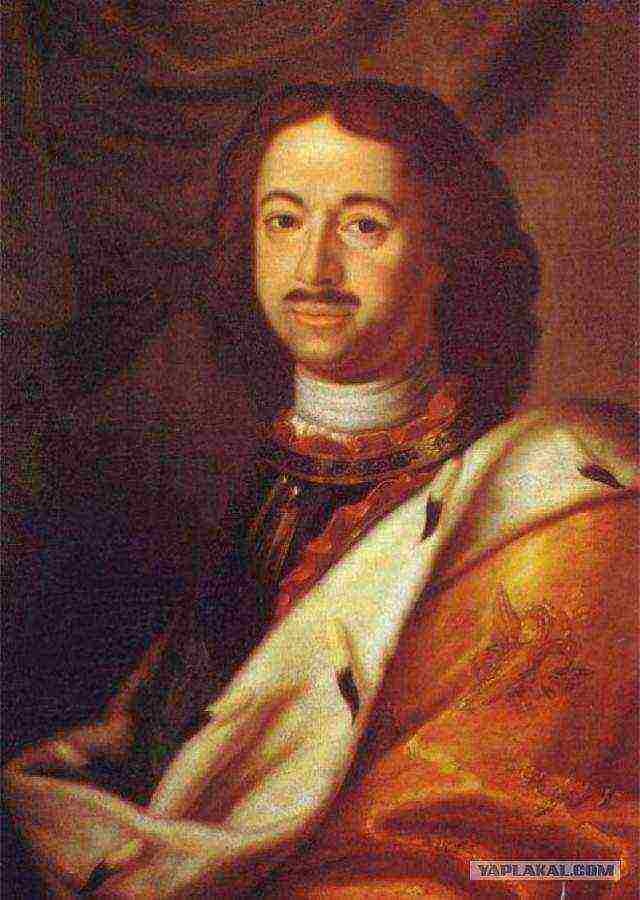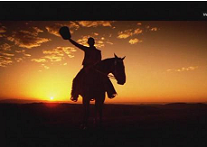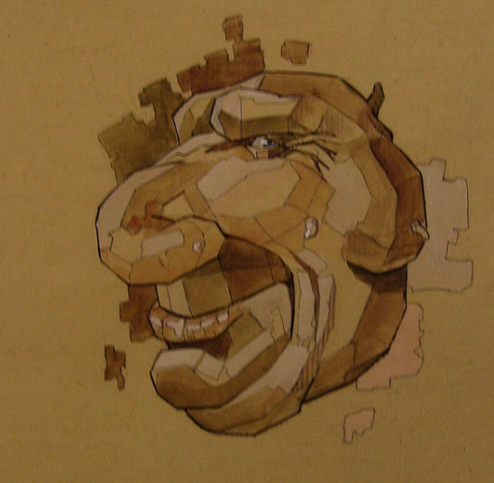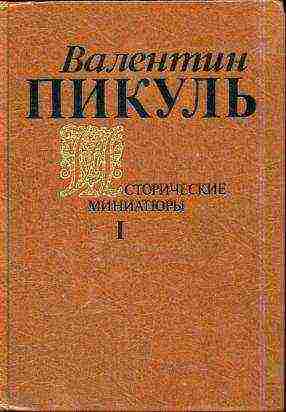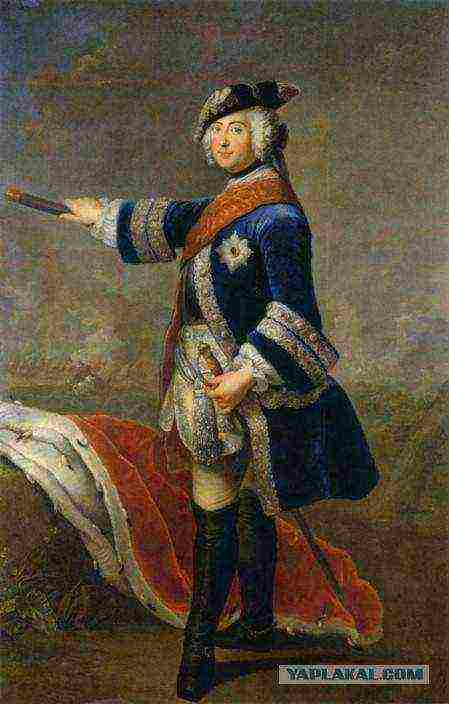Content
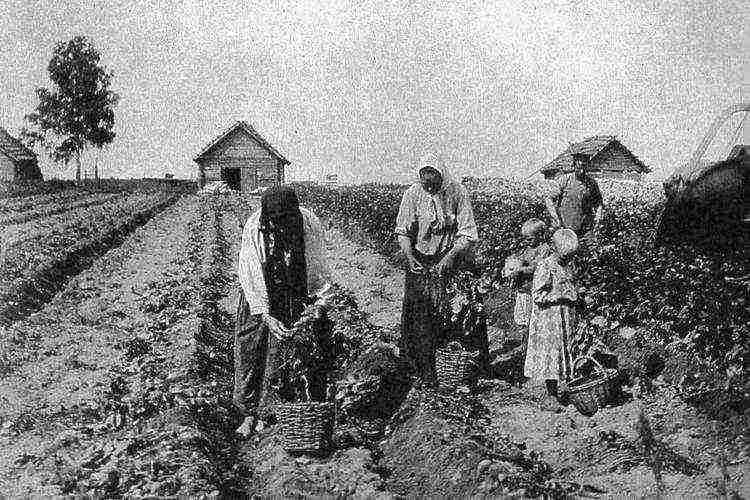
Potato riots in Russia: why did the Russians not want to eat potatoes?
“Father did not agree with potatoes when they were forced to eat potatoes; They wanted to flog him, but he ran to hide, fell through the ice, drowned "- this is a quote from the novel by Maxim Gorky" The Artamonovs Case ". This situation is not at all an invention of the author. At first, the Russians really didn’t want to eat the outlandish root vegetable.
How and why did potatoes end up in Russia?
Surprisingly, until the end of the 17th century, practically nothing was known about potatoes in Russia. They ate mainly cereals, as well as radishes, carrots, turnips and other vegetables. Peter I first tasted potatoes when he was in Holland in 1698. The tsar appreciated the dish and sent a bag of tubers to Count Sheremetyev so that he could take care of potato cultivation in Russia. However, the emperor's plan was not successful.
After Peter, Catherine II got down to business. The reasons for this were quite humane. With the help of potatoes, the empress hoped to help the starving peasants. Especially for this purpose, Catherine, following the example of Peter, ordered an outlandish root crop abroad. However, the Pugachev revolt, which, of course, had nothing to do with potatoes, prevented her from following the execution of the decree.
The greatest enthusiasm for potatoes was shown by Nicholas I. He was prompted to take decisive measures by the poor harvest in 1840. Soon the tsar signed a decree, which read: "Establish public crops of potatoes in all state-owned villages to supply peasants with seeds", as well as "encourage owners who distinguished themselves in potato cultivation with prizes and other awards."
The potato riots
Despite the hunger, the people did not immediately accept the potatoes. The peasants began to protest, because they did not understand why the land, which was formerly occupied by the usual cereals, now needs to be sown with a suspicious overseas root crop. For more than 4 years, a whole wave of so-called potato riots swept across the country.
The peasants (and the rioters turned out to be no less than half a million) completely refused to plant potatoes, burned the fields, and attacked officials. Mass uprisings took place in the Saratov, Kazan, Tobolsk, Perm, Orenburg, Vladimir, Vyatka provinces. To suppress popular unrest, the military was even allowed to use weapons.
The rebels were arrested, punished with whips, and exiled to Siberia.
Why did this happen?
As for the reasons for such a reaction of the population, there are, oddly enough, quite a few of them. First, the potato was indeed a very suspicious plant for the Russians. The fact is that turnips or rye, for example, have been cultivated by peasants for centuries, and they may have seen strange tubers, but they did not eat them. And to occupy the land with what, in their opinion, was inedible was, of course, inappropriate.
Secondly, no one explained to the people when to collect and how to cook potatoes. Therefore, many ate green potatoes, which are known to contain the poison solanine. Poisoning and even deaths were not long in coming. Most Russians, and especially Old Believers, called potatoes a "damn" or "devilish" apple for such consequences.
Thirdly, the state peasants, to whom most of the rebels belonged, who were officially considered free, but attached to the land, perceived the sovereign's decree as a return to serfdom. The world was full of rumors that the government intends to transfer state peasants to appanages or even to transfer them to private hands.
| Xollms | |
| Status: Offline
Holmes, Sherlock Holmes. Registration: 28.01.11 |
Once King Frederick II of Prussia decided to teach his peasants to eat potatoes. “Look, my peasants, what a fucking thing,” said the cunning Friedrich.- “You can fry fries from this root vegetable, and make mashed potatoes, and gratin, or just bake in a fire during hikes. Yummy". "Well, damn it, bitch, fucking now" - the Prussian peasants answered gloomily, and collectively refused to eat potatoes. Frederick had tried so many things. I obliged the burgomasters to plant these potatoes and eat them in front of the peasants. They fried potatoes, ate and cried. “Our burgomasters are crazy,” the peasants whispered anxiously. - They sit, cry, and say - glory to the king, how fucking delicious. " One burgomaster even fled to London, and there he was poisoned by something, and died in the prime of life. Potatoes, I guess. In short, the groan stood on the Prussian land. And to live like that, and you are still forced to eat all kinds of overseas rubbish. It also came to executions for failure to comply with the royal decree. The peasants proudly walked to the scaffold, and said that they would die, and not begin to devour the godless potatoes. "Even our dogs don't eat it, and you want us to put such shit in our mouths?" - the angry response of the workers to the royal derzhimorda has been preserved. And then Frederick came up with this as a last resort. He declared potatoes a "royal vegetable", planted them in his garden, and strictly, on pain of whipping, forbade stealing these potatoes from there. That, bitches, do not even dare to approach. "Uuuuuuu, so this is a completely different matter!" - the peasants were delighted. “We don't give a fuck that you can't steal there. We are Europeans. And you decided, vile satrap, to hide the goodies from us? Will not work!". And they began to actively piss potatoes from the garden. They did not have time to plant directly. As soon as they disembark, they've already been screwed. It's just some kind of Russia, not Prussia. The king kept walking, and was painfully upset. Oh, like, you whores are Prussian. Well I planted potatoes for myself. And you stole everything, you hunchback fagot. What will I eat my Prussian sausages with? The people smile in response and drag. This is how the vile Friedrich achieved his goal - everyone began to love potatoes in Prussia, make potato salad from it, and finally a lot of other things. Fucked up, in short. And now visitors bring potatoes to his grave in Sanssouci. I don’t know why. They return what the ancestors stole two hundred and fifty years ago, probably. And the moral is this: you need to know your people, yes. |
| Administration | |
|
Selling an elephant Registration: 10.12.04 |
|
| Narkozist | |||
| Status: Offline
Vivat Asclepius Registration: 10/30/14 |
Yes, it's brilliant! |
||
| avrakedavra | |||
| Status: Offline
Yarila Registration: 6.02.16 |
you burn, stsuko, almost died laughing while reading, write istcho! |
||
| stas1981 | |
| Status: Offline
liquidoreptiloid Registration: 27.08.12 |
dorm is library. a pile of decommissioned books in front of the entrance. sign - take it for free do not take put a sign ,, do not take ,, the next day not one book was left This post has been edited stas1981 — 14.04.2018 — 16:41 |
| Xollms | |||||
| Status: Offline
Holmes, Sherlock Holmes. Registration: 28.01.11 |
|
||||
| Nov73 | |
| Status: Offline
Veselchak Registration: 04/18/16 |
Suko, Friedrich came up with the idea of kartohu, but they are digging quietly from vegetable gardens and summer cottages in Russia! Fse shit from the Germans, bladi! |
| vusov1957 | |
| Status: Offline
Yarila Registration: 12/31/14 |
I heard this story about forty years ago. The current there instead of Frederick, you understand, the king of Prussia, was Peter the first, autocrat, you understand, of all Russia And the rest is one to one At school, the history teacher told |
| Family man | |||
| Status: Offline
Yarila Registration: 04/30/14 |
I also heard about Peter 1. Maybe he adopted the method? |
||
| SKV59 | |
| Status: Offline
Joker Registration: 03/07/14 |
Heard at school 45 years ago. The guards guarded the vegetable garden only during the day, and in the evening the guard was removed until morning. |
| Gipsowik | |||
| Status: Offline
Joker Registration: 12/19/15 |
Well, yes, all Russian thieves! When the winter palace caught fire in 1837, all the salvaged property was dumped nearby. By the way, ordinary people were allowed to save the palace property, in view of the enormity of the fire. Since the firefighters and the guards could not cope with the evacuation of valuable items from the fire. And after the fire, when Palace Square was unloaded from the rubble of salvaged property lying under the open sky for several days, the ministry of the imperial court began counting losses and inevitable losses, it turned out that only a coffee pot was missing from all the royal property. He was stolen on the sly by one of the soldiers of the guard. Only he failed to sell the stolen goods. For a very long time they were looking for a plate from the royal service and for a long time they sinned on the commoners who carried the royal property out of the fire. Then the snow melted and the loss was found. Lying in the square in a thawed snowdrift. This post has been edited Gipsowik — 14.04.2018 — 19:48 |
||
| Gipsowik | |||
| Status: Offline
Joker Registration: 12/19/15 |
About it? Z. Y. How Palace Square was cleaned up in 1762. After the completion of the construction of the Winter Palace, the entire Palace Square was littered with various materials and construction waste. The then reigning Emperor Peter III decided to get rid of him in an original way - he ordered to announce to the people that anyone who wants to can take anything from the square, and for free. But the people did not come. Then the chief of police came up with the following: a poster was put up "It is forbidden to touch by the highest command" and put up one policeman, who was ordered to sleep sweetly. By morning, the area was cleared. Z. Y. Of course, we got excited with the poster, then very few people knew how to read. It was necessary for the heralds to pronounce the ban orally, several times a day. This post has been edited Gipsowik — 14.04.2018 — 19:50 |
||
| Spotmatic | |||
| Status: Offline Joker Registration: 09/10/12 |
That's it!!! Frederick walks through the forest |
||
| bormoglot111 | |
| Status: Offline
Yarila Registration: 05/16/14 |
A classic example of a stratagem (misleading to achieve a goal) is the story of how the potato gained popularity in France. For a long time, the French turned up their nose at the "poisonous Indian venture." Public opinion was broken by the French Minister of Finance Turgot. He ordered the sowing of the state fields with potatoes and guarding them around them. “Since they are guarded, then something valuable,” thought the people and got into the habit of stealing “peanuts” at night. This is exactly what the cunning Turgot wanted. |
| zzzet | |
| Status: Offline
beer fairy Registration: 15.12.06 |
They also poisoned them, because they ate berries and not tubers And about the protection of potatoes, there was Peter the First. |
| Djinny | |||||
| Status: Offline
Veselchak Registration: 07/11/15 |
Now we have more and more other Russians, those that are only on the passport. And the real, more and more honest fools and seekers of justice are considered |
||||
| WT2008 | |||
| Status: Offline Yarila Registration: 8.12.10 |
The common people disliked potatoes, not because of harm. Due to their ignorance, they tried to eat flowers. And they are poisonous. Murley how much in vain. And at first, potatoes were served on the table as a sweet dish with sugar. Therefore, there were "potato riots". |
||
| AGSchik | |
| Status: Offline
Yarila Registration: 07/15/14 |
Old Man approves! By the way, the composition is made of potato peelings, by Emil Walker This post has been edited AGSchik — 15.04.2018 — 19:20 |
| yugrid | |||||
| Status: Offline
Yarila Registration: 5.01.16 |
Gypsum, do you also love Pikul? |
||||
| yugrid | |
| Status: Offline
Yarila Registration: 5.01.16 |
The smartest man of his time! A true German, the son of a British princess. He beat the French to smithereens and corresponded with Voltaire. He loved music, played the flute, but did not spare the soldiers and officers. All his life he was stingy and built beautiful palaces.I hated women, and I had to fight with three ladies at once: Maria Theresa, Elizaveta Petrovna and Madame Pompadour. During the Seven Years' War, one of the captured deserters was brought to Frederick II. The king asked: "Why did you leave me?" The deserter replied: "Because, Sovereign, in my opinion, your affairs are bad, so I decided to leave you." The next day there was a new battle, and the king recommended: "Wait until tomorrow, and if my affairs do not get better, then we defect together." Antoine Peng. King of Prussia Frederick 2. He is 34 years old in the portrait. |
| sdawww | |
| Status: Offline
Hohmach Registration: 11.02.09 |
Yaplakal rolled, on the main topic and immediately mate! Well, at least on the main censorship do - stars instead of swearing words and indicate the age (18+). It hurts in the eyes, it's just a nightmare.
|
| Only registered and authorized users can leave comments. Please log in, or register if you are not registered. |
| 1 Users are reading this topic (1 Guests and 0 Anonymous Users) | Thread Views: 20578 |
| 0 Members: | |
The first image of a potato in Europe (
Clusius
, 1588)
The homeland of the potato is South America, where you can still find wild species of this plant. The introduction of potatoes into cultivation (first through the exploitation of wild thickets) began about 9-7 thousand years ago in the territory of modern Bolivia. The Indians not only consumed potatoes for food, but also worshiped it, considering it an animated creature.
In Europe, the potato appeared in the second half of the 16th century and was first mistaken for an ornamental plant, moreover, a poisonous one. The French agronomist Antoine-Auguste Parmentier (1737-1813) finally proved that potatoes have high taste and nutritional qualities. With his submission, the penetration of potatoes began in the provinces of France, and then in other countries. Even during the life of Parmentier, this made it possible to defeat the previously frequent famine in France and remove scurvy. Several dishes are named after Parmentier, the main ingredient of which is potatoes.
Early written evidence
The first sporadic records of potatoes (yoma in the Chibcha-Muisca language) are found in Spanish documents describing the conquest of the New Kingdom of Granada (the territories of Colombia and Venezuela): by Gonzalo Jimenez de Quesada (1539, edited by an anonymous author in 1548-1549; 1550), Juan de Castellanos (1540), Pascual de Andagoya (1540) by Fernandez de Oviedo (1545). Jimenez de Quesada in his report “Summary of the conquest of the New Kingdom of Granada”, Speaking about the inhabitants of the territory he conquered, reported on the most important plants they use for food:
The food of these people is the same as in other parts of the Indies, because their main food is
maizeand
yuka... In addition, they have 2 or 3 varieties of plants from which they derive great benefit for their food, of which there are some similar to truffles, called
ionas
, others look like a turnip called
cubias that they throw into their concoction, it serves as an important product for them.
- Gonzalo Jimenez de Quesada. "A summary of the conquest of the New Kingdom of Granada."
In the manuscript of the anonymous Chibcha vocabulary and grammar (around the beginning of the 17th century) different types of potatoes are given:
- “Truffle of animals. - Niomy ";
- “Truffle, root. - Iomza iemuy ";
- “Yellow Truffle. - Tybaiomy ";
- “Wide truffle. - Gazaiomy ";
- Long Truffle. - Quyiomy ";
Conquistador Pascual de Andagoya in 1540 indicated in his “Report of the deeds of Pedrarias Davila in the provinces of Tierra Firme or Golden Castile"That" this valley and area of Popayan is very beautiful and fertile. The food is maize and some roots called papaschestnut-like roots, and other roots like turnips, besides the many fruits. "
Thanks to the historian and conquistador Pedro Cieza de Leon, Europe learned in detail about such a culture as potatoes from his work "Chronicle of Peru", published in 1553 in the city of Seville, where he also reports that he met potatoes in Quito (Ecuador), Popayan and Pasto (Colombia). He, relying both on his own observations and on the information of the predecessor conquistadors, collected thanks to his position in the apparatus of Viceroy Pedro de La Gaschi, gave his first description, the correct method of preparation and storage:
“Of the local products, with the exception of maize, there are two more, which are considered by the Indians to be the main food products. One they call Papas like truffles, after boiling they become as soft on the inside as boiled chestnuts; it has neither a shell nor a bone, only what truffles have, because it is formed underground, like them. This fruit is produced by grass, just like a field poppy "," ... and they dry it in the sun, and store it from one harvest to another. After drying, they call these potatoes „chuño“And it is very much appreciated by them and is worth a lot, because they do not have irrigation canals, as in many other places in this kingdom, to water their fields, they do not even have enough natural water for crops, they feel need and deprivation if they do not have of this dried potato. "
Potatoes were first brought to Europe (Spain), probably by the same Cieza de Leon in 1551, upon his return from Peru. The first evidence of the use of potatoes in food also relates to Spain: in 1573 it is listed among the products purchased for the Hospital of the Blood of Jesus in Seville. Later the culture spread to Italy, Belgium, Germany, the Netherlands, France, Great Britain and other European countries.
Peru
It is argued that the Inca calendar used the following way of determining the daytime: the measure was the time it took to boil potatoes - which was approximately equal to one hour. That is, in Peru they said: so much time has passed as it would have taken to prepare a dish from potatoes.
A description of the traditional method of cooking potatoes by the Peruvians is contained in a letter from the French explorer Joseph Dombay, dated May 20, 1779. Potatoes, along with corn, were a unique product of the Peruvians, who took them with them on long trips. They cooked potatoes in water, peeled and dried in the sun. The resulting product is used.papa seca mixed with other products. There was another cooking method. The tubers were frozen and trampled (?) With their feet to peel them. The mixture thus prepared was placed in a stream of water under a press. Fifteen to twenty days later, the resulting product was dried in the sun. The product thus obtained was called isp.chuño and "was pure starch that they could use to make powder (for the hair)." isp.chuño it was used to make jams, flour for the sick and additives to other dishes.
-
Chuño
-
Tunta, or chuño
-
Autre tunta
Freezing followed by dehydration is nothing more than freeze-drying by natural means. This means that you need to add water to consume. Chugno was part of the diet of the Indians working in the silver mines.
Chugno is produced in the Altiplano, namely in Souni and Puna (an area in the Cordillera), where there are specific ecological and climatic conditions. Chugno is eaten in Argentina, Bolivia, Chile and Peru. According to Redcliffe Salaman, chunyo was ground into flour and added to stews and various soups.
Another traditional method of cooking potatoes is to hold the tubers for 6 months in a stream of water. The product obtained as a result of fermentation, isp.chuño podrido used to make Mazamorra dessert.
Bishopric of Liege
In all likelihood, the first cookbook containing recipes for potato dishes belongs to the pen of Lancelot de Casteau (fr.) Russian, the chef of three (successive) princes-bishops of Liege. A book published in 1604 under the title Ouverture de cuisine contains four recipes for cooking a dish that was still exotic for Europeans.
Ouverture de cuisine facsimile spread
|
|
|
|
The lack of salt in the filling is explained by the fact that at that time there was enough salt in the oil.
De Casto did not leave comments on the origin, price of potatoes, and their availability on the market. However, he has been using potatoes since at least December 12, 1558, as "boiled potatoes" appear on the menu (3 courses) of the banquet given in honor of Archbishop Robert's joyeuse entrée.
Illustration from the herbarium of J. Gerard (1633)
Ireland
In Ireland, the potato appeared at the end of the 16th century. It quickly gained popularity and by the end of the 18th century, it had firmly established itself as a staple in the diet of Irish peasants.
In peasant houses, potatoes have always been part of the dinner in one form, the easiest to prepare, boiled in water. The tubers, together with the peel, were boiled in a cauldron. The contents of the cauldron were poured into a wicker basket (eng. Skeehogue), allowing water to pass through, and family members, sitting around the basket and in front of the fireplace, ate directly from the basket with their hands.
The potato crop failure, provoked by the influence of the pathogenic microorganism Phytophthora infestans, which causes late blight, became one of the reasons for the mass famine that struck Ireland in the middle of the 19th century. This, in turn, gave rise to a massive emigration of the Irish to the New World, and above all to the United States of America.
France
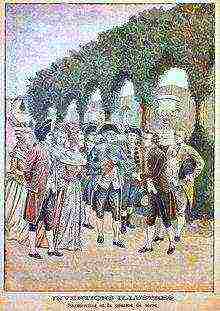
Since its appearance in Europe, potatoes have gained popularity in the bishopric of Liege, Ireland, Germany, Switzerland, Italy. In France, due to the similarity with the known poisonous representatives of the Solanaceae family, as well as the lack of storage and use technologies, the introduction was slowed down. In addition, there were problems of a purely agronomic (unsuitable environmental conditions) and religious (non-recognition of tithes).
Olivier de Serre, in his 1600 book Théâtre d'agriculture et Mesnage des champs, recommended the cultivation of potatoes and compared its taste ("white truffle") with the best examples of black truffles.
By 1750, many people and organizations began to recommend the cultivation and consumption of potatoes: Duhamel du Monceau, Bishops of Albi and Leon, Minister Turgot, Rosa Bertin, Rennes Agricultural Society. Even ten years before the publications of Antoine Parmentier and Samuel Angel, Duhamel du Monceau urged farmers not to ignore potatoes and noted that "... is an excellent product, especially with bacon or corned beef."
But the masses were skeptical about potatoes. Most of the French treated it with disdain, although in some areas it was grown and consumed. Potatoes were an alternative to wheat, a staple food shortage of which for centuries led to hunger and panic at the dawn of the French Revolution.
Parmentier was particularly active in promoting the cultivation of potatoes as a vegetable crop.His treatise Examen chymique des pommes de terres (1774) proved the high nutritional value of potatoes. The government and the royal family itself took up the introduction of a new culture. It is said that Queen Marie Antoinette loved to curl potato flowers into her hair.
Russia
The Free Economic Society associated the appearance of potatoes in Russia with the name of Peter I, who at the end of the 17th century sent a bag of tubers from Holland to the capital, allegedly for distribution to the provinces for cultivation. The outlandish vegetable did not become widespread in Russia in the first half of the 18th century, although the "Historical note on the introduction of potato culture in Russia" reads:
The foreign innovation was adopted by individuals, mainly foreigners and some representatives of the upper classes ... Even in the reign of the Empress
Anna Ivanovnaat the prince's table
Bironpotatoes have already appeared as a tasty, but not at all rare tasty dish.
At first, potatoes were considered an exotic plant and were served only in aristocratic houses. In 1758, the St. Petersburg Academy of Sciences published an article "On the cultivation of earth apples" - the first scientific article in Russia on the cultivation of potatoes. A little later, articles on potatoes were published by Ya. E. Sivers (1767) and A. T. Bolotov (1770).
State measures for the distribution of potatoes were taken under Catherine II: in 1765, the Senate Instruction "on the cultivation of earthen apples" was issued. The manual contained detailed recommendations for breeding and using a new crop and, together with potato seeds, was sent to all provinces. This happened in line with the general European tendency: "Potatoes began to be cultivated on an extensive scale since 1684 in Lancashire, since 1717 in Saxony, since 1728 in Scotland, since 1738 in Prussia, since 1783 in France." Compared to rye and wheat, potatoes were considered an unpretentious crop, so they were considered a good help in poor harvests and in non-grain-bearing areas.
In the "Economic description of the Perm province" of 1813, it is noted that peasants grow and sell "superbly large white potatoes" in Perm, but they are skeptical about the increase in sowing: "They are always ready to answer that they do not have enough time to sow the necessary bread, since potatoes, which must be planted with your hands. The peasants eat potatoes “baked, boiled, in porridge, and they also use flour to make their own pies and shangi (a kind of pastry) from it; and in cities they spice them up soups, cook them with roast and make flour from it for making jelly. "
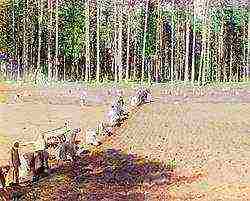
Due to the many poisonings caused by the consumption of fruits and young tubers containing solanine, the peasant population at first did not accept the new culture. Only gradually did he gain recognition, displacing turnips from the peasant ration. Nevertheless, as early as the 19th century, many peasants called potatoes "the devil's apple" and considered it a sin to eat them.
State measures were taken in the future. So, in Krasnoyarsk, they began to grow potatoes since 1835. Each family was obliged to grow potatoes. For failure to comply with this order, the perpetrators were supposed to be exiled to Belarus, to the construction of the Bobruisk fortress. Every year, the governor sent all the information about growing potatoes to St. Petersburg.
In 1840-42. on the initiative of Count Pavel Kiselev, the area allocated for potatoes began to increase rapidly. According to the decree of February 24, 1841, "On measures to promote the cultivation of potatoes," the governors had to regularly report to the government on the rate of increase in the sowing of the new crop. In a circulation of 30,000 copies, free instructions on the correct planting and growing of potatoes were sent out all over Russia.
As a result, a wave of "potato riots" swept across Russia. The people's fear of innovations was also shared by some enlightened Slavophiles. For example, Princess Avdotya Golitsyna "defended her protest with perseverance and passion, which was quite amused in society."She declared that potatoes "are an encroachment on the Russian nationality, that potatoes will ruin both the stomachs and the pious manners of our time immemorial and God-protected bread and cash-eaters."
Nevertheless, the "potato revolution" of the times of Nicholas I was crowned with success. By the end of the 19th century, more than 1.5 million hectares were occupied by potatoes in Russia. By the beginning of the 20th century, this vegetable was already considered in Russia "the second bread", that is, one of the main food products.
Notes (edit)
- ↑ Lost Crops of the Incas: Little-Known Plants of the Andes with Promise for Worldwide Cultivation
- ↑ A more accurate name in the Chibcha language is "Yoma" or "Yomui"
- ↑ Gonzalo Jimenez de Quesada. A summary of the conquest of the New Kingdom of Granada "(1539; 1548-1549) .. (A. Skromnitsky) (April 20, 2010). Retrieved April 20, 2010. Archived August 21, 2011.
- ↑ González de Pérez, María Stella. Diccionario y gramática chibcha. Imprenta patriótica del Instituto Caro y Cuervo. Bogotá. 1987, p. 331
- ↑ Pascual de Andagoya. Narrative of the proceedings of Pedrarias Dávila in the provinces of Tierra Firme or Catilla del Oro: and of the discovery of the South Sea and the coasts of Peru and Nicaragua. - London: Hakluyt Society, 1865. - p. 58.
- ↑ Cieza de Leon, Pedro. Chronicle of Peru. Part one. Chapter XL. - Kiev, 2008 (translated by A. Skromnitsky). Archived July 9, 2012.
- ↑ In the dictionary of Diego Gonzalez Holguin (1608): Chhuñu... Stayed / dried potatoes, frozen in the sun.
- ↑ Cieza de Leon, Pedro. Chronicle of Peru. Part one. Chapter XCIX. - Kiev, 2008 (translated by A. Skromnitsky). Archived July 9, 2012.
- ↑ Montanari Massimo. Hunger and abundance. M., 2009. p. 129
- ↑ Bernabe Kobo, A Story of the New World (Volume 3, Book 12, Chapter XXXVII). Archived July 11, 2012.
- ↑ "Proceedings of the Free Economic Society", 1852
- ↑ Berdyshev A.P. Andrei Timofeevich Bolotov: The first Russian scientist agronomist. - Gosselkhozizdat. - M., 1949 .-- 184 p. - 25,000 copies.
- ↑ № 12406. - May 31. Instruction - on the cultivation of earthen apples, called potetes (potatoes) // Poln. collection laws Ros. Empire. Sobr. 1st. SPb., 1830. T. 17. S. 141-148.
- ↑ Potatoes // Brockhaus and Efron Encyclopedic Dictionary: in 86 volumes (82 volumes and 4 additional). - SPb., 1890-1907.
- ↑ Economic description of the Perm province: at 3 o'clock, Part 2. St. Petersburg, 1813, p. 162.
- ↑ From the history of potatoes in the world and in Russia (Russian). Retrieved March 20, 2011. Archived July 2, 2012.
- ↑ Guide to botany / comp. V.V. Grigoriev. 4th ed. - M .: publication of the Salaev brothers, 1865 .-- P. 232.
- ↑ s: Old notebook 181-190 (Vyazemsky)
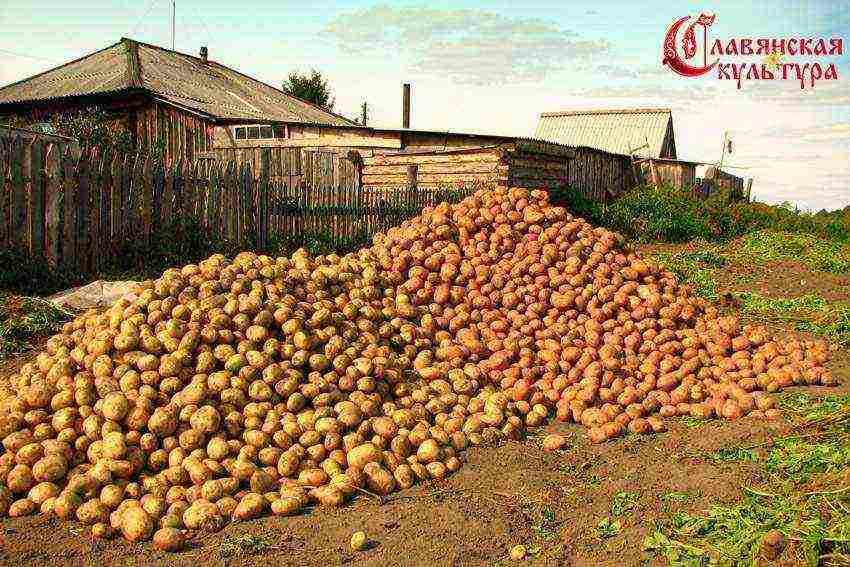
Potatoes were brought to Russia quite late, at the very beginning of the 18th century. This was done by Peter I, who was the first to taste various potato dishes in Holland. Having approved the gastronomic and taste qualities of the product, he ordered the delivery of a bag of tubers to Russia for planting and growing.
In Russia, potatoes took root very well, but Russian peasants were afraid of an unknown plant and often refused to grow it. Here begins a very funny story connected with the way to solve the problem, which Peter I resorted to. The Tsar ordered to sow the fields with potatoes and put armed guards on them, who were supposed to guard the fields all day long, and went to sleep at night. The temptation was great, peasants from nearby villages could not resist and stole potatoes, which became for them a sweet forbidden fruit, from the sown fields for planting on their plots.
At first, cases of potato poisoning were often recorded, but this happened, as a rule, due to the inability of the peasants to use potatoes correctly. The peasants ate the fruits of potatoes, berries that resemble small tomatoes, which are known to be unsuitable for food and even poisonous.
Of course, this did not become an obstacle to the spread of potatoes in Russia, where it gained immense popularity and many times saved a significant part of the population from starvation during crop failures. No wonder in Russia potatoes were called the second bread. And, of course, the name of the potato speaks very eloquently about its nutritional properties: it comes from the German words "craft teffel", which means "devilish strength".
About potatoes. How potatoes were introduced in Russia
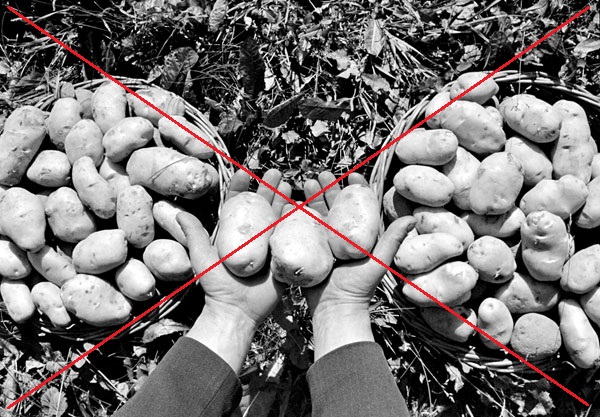
“Potato - has a weak, unbalanced, uncertain energy, an energy of doubt. The body becomes lethargic, lazy, sour.The solid energy of potatoes is called starch, which in the body does not lend itself to alkaline-acid processing, is poorly excreted from the body, sharply reduces the speed of thought, and blocks the immune system. Potatoes are not compatible with any products. If there is, then separately, it is advisable to cook in a uniform. In the peel and just below it, there is a substance that helps break down the starch.
In Russia there has never been a potato, it was brought in by the "dark" and cultivated by force. Gradually, they brought it out and designated it in people's minds as the main vegetable, which greatly harmed the human body. Today it is the most important vegetable product on the table, it is considered the second bread, and healthy vegetables have been transferred to the category of secondary ones.
We ask you not to eat potatoes for students of the School "Happiness", where everything is aimed at increasing the speed of thought, because potatoes will reduce everything to zero.
Potatoes can be eaten young for two months, then they become poisonous. Substitute turnips for potatoes. It is no coincidence that they try to completely remove turnips from food. ”
(from the book "Knowledge stored by dolmens", A. Savrasov)
Also, everyone who is interested in healthy eating knows that potatoes are a very mucus-forming product, and mucus is practically not excreted from the body, but is deposited, causing many diseases ("traditional" medicine, of course, knows nothing about this)).
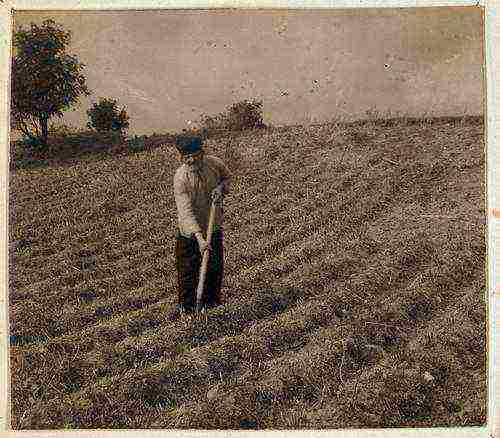
There was a time when Russian Old Believers considered potatoes to be a devilish temptation. Indeed, this foreign root crop was forcibly introduced into the Russian land! The clergy, anathematizing, christened him "the devil's apple." To say a good word about potatoes, and even in print, was very risky. But today, many of our fellow citizens are sure that the potatoes are from Russia, or, at worst, Belarus, and America gave the world only fries.
The potato was first brought to Europe after the conquest of Peru by the Spaniards, who spread it across the Netherlands, Burgundy and Italy.
There is no exact information about the appearance of potatoes in Russia, but it is associated with the Peter's era. At the end of the 17th century, Peter I (and again Peter I), while in the Netherlands on ship business, became interested in this plant, and “for brood” sent a bag of tubers from Rotterdam to Count Sheremetyev. To speed up the spread of potatoes, the Senate only in 1755-66 considered the introduction of potatoes 23 TIMES!
In the first half of the 18th century. potatoes were cultivated in significant numbers by “particular people” (probably foreigners and people of the upper class). Measures for the widespread cultivation of potatoes were first taken under Catherine II, on the initiative of the Medical College, of which Baron Alexander Cherkasov was president at that time. Initially, it was a question of finding funds to help the starving peasants of Finland “without a big dependency”. On this occasion, the medical board reported to the Senate in 1765 that the best way to prevent this disaster "is in those earth apples, which in England are called potetes, and in other places, earth pears, tartuffles and potatoes."
At the same time, at the behest of the empress, the Senate sent seeds to all places of the empire and instructions on the development of potatoes and care for this were entrusted to the governors. Under Paul I, it was also prescribed to grow potatoes not only in gardens, but also on field land. In 1811, three colonists were sent to the Arkhangelsk province with instructions to plant a certain number of tithes of potatoes. All of these measures were sketchy; the mass of the population greeted the potato with distrust, and its culture was not grafted.
Only in the reign of Nicholas I in view of the former in 1839 and 1840. with poor grain harvests in some provinces, the government took the most energetic measures to spread the crops of potatoes. By the highest orders that followed in 1840 and 1842, it was decided:
1) to establish public crops of potatoes in all state-owned villages to supply these latter to the peasants for future crops.
2) publish an instruction on the cultivation, storage and use of potatoes.
3) to reward with prizes and other awards the owners, differing in the cultivation of Potatoes.
The implementation of these measures was met in many places with stubborn resistance from the population.
So, in the Irbit and neighboring districts of the Perm province of states, the peasants somehow connected the idea of selling them to landowners with the prescription of public sowing of potatoes. A potato riot broke out (1842), which was expressed in the beating of the village authorities and demanded to pacify their assistance military teams, which in one volost were even forced to use canister;
In terms of the number of peasants who participated in it and the vastness of the region it covered, this was the largest of the Russian unrest of the 19th century, which entailed reprisals, which were usually distinguished at that time by cruelty.
Interesting fact:
The owner of the estate, General R.O. Gerngros, growing tubers since 1817, gave them for seeds and peasants. However, the crops on the peasant plots turned out to be sparse. It turned out that the peasants, having planted tubers, dug up and sold “damned earth apples” for vodka in the nearest tavern at night. Then the general went for a trick: he gave out not whole, but cut tubers for seeds. Their peasants did not choose from the land and reaped a good harvest, and after making sure of the convenience of potatoes, they themselves began to grow it.
In general, those who needed and profitable for the Russian people to degrade, achieve their goal and potatoes become our second bread.
Similar articles:
Cuisine → Tea from Gorma, bread from Vehka
Nature → How to live in harmony with nature?
Cuisine → The benefits of black currant
Kitchen → Foods that give and take energy
Health and Beauty → Gifts of Nature - antibiotics

